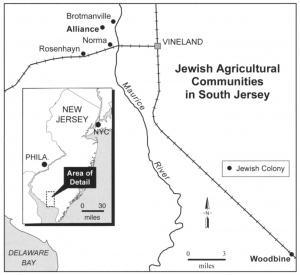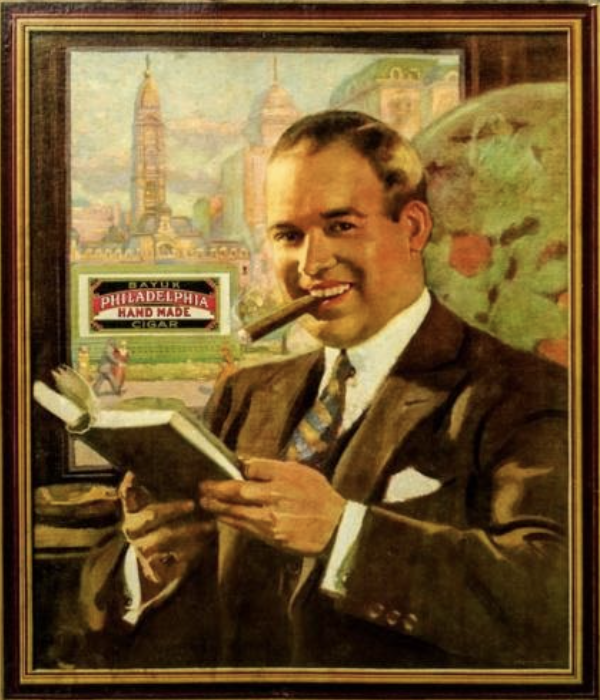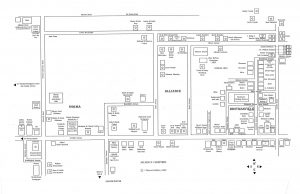Alliance began its journey in 1882 as a commune in the utopian Am Olam movement. All of Alliance’s original settlers had recently arrived in the United States from the Russian Empire. Some of them came to Alliance after Am Olam’s Montefiore Commune failed in Ford County, Kansas. At the time of Alliance’s founding, southwestern New Jersey was a welcoming place for immigrants. The reception of these Jewish colonists in Cumberland County was no different.
Alliance members took the colony’s name in honor the Alliance Israélite Universelle, a Paris-based Jewish philanthropic organization founded in 1860 that purchased this land for them. Until the early 1900s colonists also called their new home “New Jerusalem.” In its first years, Alliance also enjoyed support from other philanthropists, like the Mansion House Committee of London and the Hebrew Immigrant Aid Society in New York.
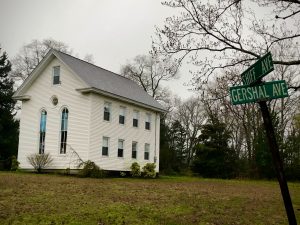
Tefereth Israel Synagogue, Alliance Colony, undated
at the corner of Gershal & Shiff Avenues
Like all the Am Olam communes in North America, Alliance experienced severe instability, which led to the departure of many founding members by the mid-1880s. Counter-balancing their troubles, early Am Olam communards were buoyed by the goodwill of their neighboring Christian farmers who taught them how to clear the stony fields and cultivate crops. As descendants of Alliance like to say, that friendship made Alliance an American story, not just a Jewish one. The colony’s first synagogue opened in 1888.
Having gained experience in support of Jewish colonies in Argentina, the de Hirsch Fund began direct support of Alliance in the 1890s. The Fund introduced professional administration and mixed vegetable farming instead of single-crop farms. To stabilize the colony even more, the Fund worked to bring to small-scale industry to Alliance for winter employment and supplementary household income. Within a few years Alliance boasted clothing, canning and cigar factories.
Founded in Philadelphia in 1896 by three sons of Moses Bayuk (a founder of Alliance), the company produced cigars until 1984. Evidently the young Bayuks, after moving to Philadelphia, capitalized on knowledge they had acquired from Alliance’s cigar factory.
Advertisement for Bayuk Cigars, Inc., 1920s.
Credit: Courtesy of William Levin
Proud of what they were accomplishing, Alliance colonists lived on streets named for its benefactors: Gershal, Lewisohn, Seligman, Steinfeld, Schiff, Isaacs and Rosenfeldt. By 1900 Alliance was home to 100 families. Within a year, that figure rose to 151 adults and 345 children, who lived on 78 farms on a total of 1400 acres.
Improvement in Alliance’s fate also came from strength in numbers after the founding of nearby colonies like Carmel, Rosenhayn, Six Points and Garton Road. Alliance also benefitted from proximity to Vineland, a medium-sized town that provided services and educational opportunities for all of the Jewish colonies in south New Jersey. Over the years, Vineland became home to many colonists who preferred an urban life.
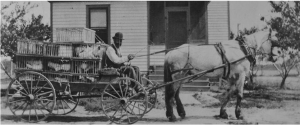
Jewish poultry farmer taking chickens to market, Alliance colony, undated
Credit: Alliance Colony Foundation
Like other Jewish colonies in the United States, Alliance faced depopulation after the Second World War, accelerated by the disappearance of family farms and the postwar G.I. Bill, which allowed discharged veterans – of which there were many in the Jewish colonies – to pursue free university education. But Alliance, Carmel, Norma and Brotmanville temporarily kept depopulation at bay with the arrival of approximately 1000 families of Holocaust survivors and former Displaced Persons from Europe who resettled on poultry abandoned farms between 1946-1952.
Click here to listen to William Kahane where he describes here how his and other Holocaust survivor families from Europe found a new life in Vineland, New Jersey, after the war.
Let’s take a closer look at how agricultural settlement worked for Alliance’s immigrant colonists. This pattern characterized life for most Jewish colonists throughout North America after the Am Olam debacle
-
The founding colonists lived in communal barracks until their homes were built by support organizations.
-
Once the houses were ready, the philanthropies provided colonists long-term, low-interest mortgages for farms of twelve to fifteen acres.
-
These farms came with simple 2-bedroom homes at a cost of $150.
-
Most colonists in Alliance and Norma farmed their own land and supplemented their income with off-season labor.
-
In Brotmanville, residents worked mostly in local factories or the service sector, with others opened small businesses.
-
All the colonists prioritized education. Their children enrolled in public schools in nearby Vineland.
-
In October 1889, eighty original pioneers of Alliance became American citizens.
-
The colony’s founders were Orthodox Jews. They rested on Saturdays and imported kosher meat from Philadelphia until a kosher butchery opened in Brotmanville.
-
In the 1910s Alliance boasted a public library, a night school for adults, lectures, concerts, music lessons and a shared beach on the Maurice River. Although no trace remains, the Hirsch Hotel next to the beach hosted city Jews or family members looking for a place to relax.
The remarkable map below, prepared by a descendant of Brotmanville, shows the layout of Alliance with its “suburbs” of Norma and Brotmanville, including the names of family homes. As we see, Alliance had many businesses, public and religious buildings. “Alliance Beach” refers to a spot on the Maurice River that was a center of seasonal social life. “Pioneer settler” (marked with a Star of David) denotes the homes of colonists descended from the original Alliance members.
Please click on the image below to view a larger version of the map
Credit: Courtesy of Jay Greenblatt
Brotmanville
Collapse of the Am Olam movement in the mid-1880s caused the remaining colonists in Alliance – as well as Jewish philanthropists who supported them – to reassess the future of Jewish farms in the United States. One response to the moment was introduction of light industry into existing and new colonies. In Alliance, the shift came first with the arrival of Abraham Brotman in the 1890s. Brotman, with roots in Galicia, relocated his clothing factory and most of his employees from Brooklyn to Alliance. The factory and employees became a manufacturing and residential subsection of Alliance, the subsection eventually being named Brotmanville.
Along the same lines of light industrialization, in 1900 the Allivine Canning Factory opened in the Norma subsection of Alliance. Among other sources, the produce for Allivine came from Jewish colonies in southern New Jersey.
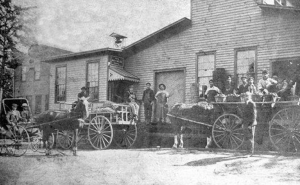
Allivine Canning Company, Norma, NJ, circa 1905
Credit: Sam Azeez museum of Woodbine Heritage at Stockton University
Among its points of pride, and as a clear sign of the Americanization of its youth, Norma sponsored an amateur baseball team for its youth.
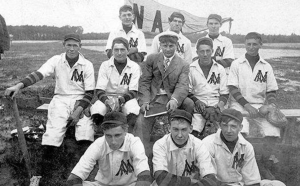
Norma Athletic Association’s baseball team, 1904
In the early 1900s sixty families worked at Brotman’s clothing factory while others earned their livelihoods from farm-related trades like butchery and mechanics. The Jewish Agricultural Society – founded in New York in 1900, as a U.S. successor to de Hirsch’s Europe-based Jewish Colonization Society – supported subdivision of colonies, believing that homogenous communities comprised of families from similar locations in Eastern Europe would be more harmonious than colonies of mixed membership. The US Postal Service also promoted subdivision of larger colonies in order to assign separate ZIP codes and thereby facilitate mail delivery.
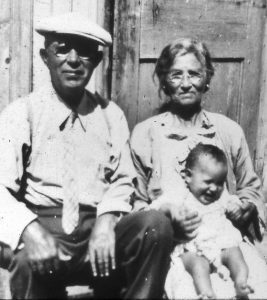
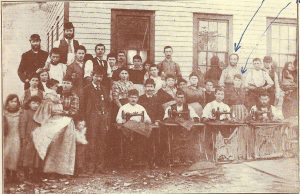
Left: The Brotman family
Right: Brotman clothing factory in Alliance
Credit: Courtesy of Rich Brotman Archive
In the 1980s a local church purchased Brotmanville’s old synagogue. Descendants of the colony transferred some of the synagogue’s objects to a museum located at the gate of Alliance’s cemetery.
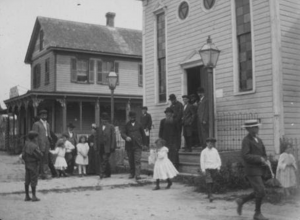
Colonists at the Brotmanville synagogue, circa 1910
Credit: JewishGen website
Click below to view, “First Chapter in a New Book”, a documentary film by Rich Brotman. This film documents through oral histories the story of Brotmanville and includes interviews with veteran colonists in the area and their descendants. Originally released and screened in 1982. Updated and rereleased in 1984. Remastered for DVD 2007.
Credit: Courtesy of Rich Brotman Archive
